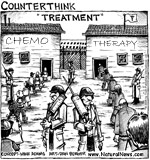Turmeric Healing Properties for Cancer
| Share on Facebook | Share on Twitter | Share on Google+ |
The antioxidant curcumin, which is found in the herb turmeric, is becoming one of the best-known and most frequently buzzed about natural therapies for cancer patients. I've written about the potential of turmeric in cancer treatment several times in my own blogs, and these pages invariably gain large numbers of readers who read the entire page closely.
Turmeric's healing properties are accepted even by most knowledgeable physicians. But it's important to understand that many of these healing properties have only been confirmed on a laboratory level, by observing what happens when scientists add turmeric extracts or curcumin to cultures of cancer cells in a test tube or Petri dish. For most of the health benefits of curcumin for cancer, it is not a sure thing that taking curcumin or turmeric supplements would have the same effect in your cancer. There are too many variables in how the curcumin is absorbed from the digestive tract and how many other substances are competing for enzymes that activate (or that are activated by) curcumin in the liver. But here is what is generally known.
Curcumin for Colon Cancer
On a laboratory level, scientists know that curcumin from turmeric has a number of positive effects in fighting colon cancer. Some of these effects are:
- Curcumin helps colon cells make more glutathione for quenching the free radical reactions that damage DNA at the earliest stages of cancer development.
- Curcumin inhibits the Apc (adenomatous polyposis coli) gene, which triggers the formation of pre-cancerous colon polyps.
- Curcumin inhibits the liver enzyme CYPA1A, which transforms solvents like toluene and carbon tetrachloride (found in petrochemicals and dry cleaning chemicals) into cancer-causing forms.
- Curcumin inhibits the metalloproteinases, which are enzymes that help a cancerous tumor develop its own blood supply.
- In combination with the chemotherapy drug 5-FU, curcumin stops the formation of stem cells that become colon cancer cells.
These five healing properties of curcumin make turmeric a promising herb for cancer prevention and cancer treatment. However, curcumin also has one characteristic that would make it an undesirable choice for some colon cancer patients:
- Curcumin also interferes with the action of the "cancer watchdog" gene p53 in the colon. This gene is activated in cancerous cells to trigger a series of steps ending in apoptosis, also known as "cell suicide." The p53 gene is essentially a gun pointed at the head of the DNA in a cancerous cells. Curcumin stops this gene from doing its job.
However, p53 is only important in stage III and stage IV of colon cancer. If you don't have colon cancer, or if you have a localized colon cancer, curcumin and turmeric would seem to be helpful. If you are on chemotherapy for stage III colon cancer, curcumin and turmeric also seem to be helpful. It's only if you have undiagnosed stage III or stage IV colon cancer that you should not take curcumin. If you have colonoscopy after the age of 50, or after you are diagnosed as having a familial form of colon cancer or you test positive for the BRCA-1 gene, then you will get early detection for simpler treatment and you will avoid inappropriate use of curcumin or consumption of turmeric with food.
What if you already have colon cancer? Here is what I told readers of my blog:
- Curry powder is about 3% curcumin. It's simply a lot easier to get more curcumin from supplements than food.
- Clinical studies have found that curcumin is safe for colon cancer patients (although you should not take it or any other supplement without having a discussion with your doctor first). Up to 8 grams (8,000 mg) a day has not produced ill effects.
- Clinical studies of advanced colon cancer patients who were also receiving chemotherapy found that curcumin extended life in about 10% of cases. There are no reliable studies on the effect on colon cancer survival rates.
- Scientists at Baylor Medical School in Houston, Texas report that curcumin increases the sensitivity of cancer cells to chemotherapy with doxorubicin, 5-FU, paclitaxel, vincristine, melphalan, butyrate, cisplatin, celecoxib, vinorelbine, gemcitabine, oxaliplatin, etoposide, sulfinosine, thalidomide, and bortezomib.
- Baylor Medical School scientists also report that curcumin may protect the heart and mouth from side effects of radiation treatment.
- The important thing to remember is that curcumin and turmeric are only part of any program of treatment for colon cancer. Even if you rely on surgery and just herbal therapies for your cancer (which is not something I would recommend), you still need more than just curcumin and/or turmeric.
Curcumin for Lung Cancer
There is a very long list of very impressive reasons that turmeric and curcumin should be helpful in preventing and possibly treating lung cancer. Most of the research has focused on using turmeric and curcumin to make radiation treatment and chemotherapy more effective so lower doses can be used to kill the cancer with fewer side effects. Curcumin seems to "pre-treat" lung cancer tumors in ways that make them more susceptible to radiation and the surrounding tissue less susceptible to radiation. It also has a synergistic action with the chemotherapy drug cis-platin (Platinol), sometimes making it possible to treat cancer with less chemo. Your oncologist will know about these studies and be able to advise you how much curcumin to take and when.
What if you are interested in preventing lung cancer, or you are concerned about the effects of second-hand smoke?Or your main concern is chronic obstructive pulmonary disease (COPD), also caused by exposure to tobacco smoke?
People who consume relatively large amounts of turmeric in food, or who take curcumin supplements, a number of studies tell us, produce fewer inflammatory chemicals in the lungs when exposed to tobacco smoke. The curcumin in supplements and in the spice turmeric also seems to inhibit the production of a substance called NF-kappaB. It slows down the production of growth factors that cause the formation of scar tissue in the lungs, and it helps change the balance of white blood cells to lower the number of CD4 cells that cause asthma and increase the number of CD4 cells that stop asthma.
As is the case with colon cancer and pre-cancerous conditions of the colon, turmeric is not a complete cure for lung cancer or pre-cancerous conditions of the lungs. People who take curcumin or who eat foods seasoned with turmeric, however, may have much higher quality of life as they deal with lung disease.
Curcumin and Turmeric for Skin Cancer
There is good evidence for using turmeric and curcumin for treating the common pre-cancerous skin condition known as actinic keratosis. Excessive exposure to the sun causes damage to the DNA in the cells in the top layers of the skin.
At first there may just be a dry patch of skin. It might be a spot on the lip that seems to cry out for lip balm or a patch of skin on the face, backs of the hands, neck, or forearms that looks gray and rough.
After a few months or a few years, the actinic keratosis may become incredibly itchy. The "itchy phase" is the last pre-cancerous phase, and having a tiny spot of intense itching 24/7 actually sends a lot of people to the doctor for diagnosis and treatment.
The "itchy phase" is the time that curcumin and turmeric for the skin can be especially helpful. Creams made with turmeric and curcumin, such Vicco Turmeric Skin Cream, will stop itching nearly 100% of the time. A clinical study found that using turmeric skin cream will stop the progression of skin damage to skin cancer about 70% of the time. And if the actinic keratosis has already become a cancerous basal cell carcinoma, turmeric creams will actually shrink the tumor about 10% of the time. That is not, however, a substitute for simply having the tumor frozen off at the dermatologist's office.
Products like Vicco Skin Cream and any European-made sunblock that contains the ingredient "E100" will give you some skin cancer protection. The key is to get the sunscreen ingredients to protect the skin with turmeric to stop the progression of skin cancer.
I haven't provided references here, but I have provided a comprehensive list of references for the article Turmeric.
Turmeric Cancer Research
-
Skin CareMen Skin Care
-
Free ResourcesFree eBooks
-
Half the costs of illness are wasted on conditions that could be prevented.Dr. Joseph Pizzorno
-
Featured Health SupplementTotal Balance is like no other
 … in that it utilizes state of the art delivery systems not generally used in a supplement...
… in that it utilizes state of the art delivery systems not generally used in a supplement...
-



















